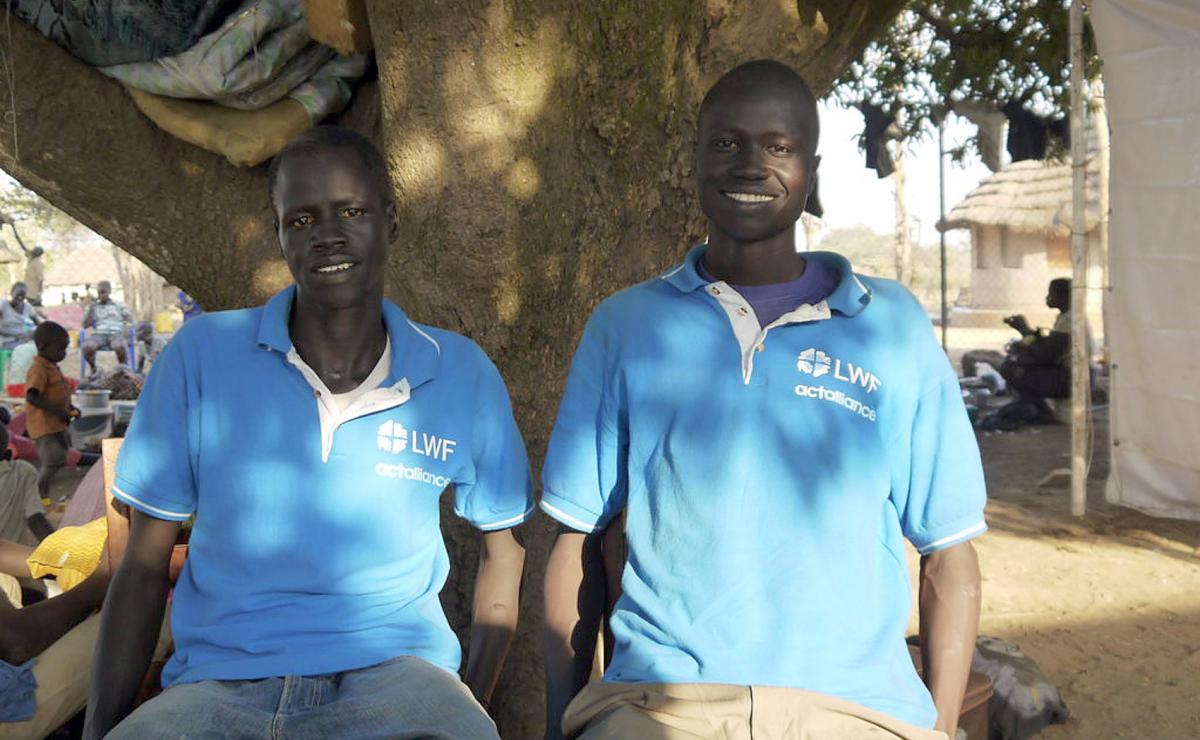Now Refugees in Uganda, LWF South Sudanese Staff Support Emergency Response in Adjumani

LWF Provides Life-Saving Assistance to Thousands Seeking Refuge in Camps
(LWI) - The unfolding crisis in South Sudan has affected more than half a million civilians. Over 100,000 people have fled to neighboring countries, including Uganda, where around 59,000 have sought safety.
John Garang and Peter Jok, who recently escaped to Uganda from their homes in South Sudan, were both working for The Lutheran World Federation (LWF) in Upper Nile State. They currently support LWF’s emergency response in Uganda, carried out through the ACT Alliance churches’ network.
“I have some problems sleeping now, I know I am safe here, but still I am not sure I feel safe. I did not think I would survive,” Garang says. “I was running with bullets around my ears, and in between the tanks; more than 20 people in the crowd were killed. Two of them were my clan members. It is a miracle I survived.”
Garang, who had worked as an education assistant officer with the LWF program in Maban county was studying in Upper Nile when the conflict started in December. Like thousands of South Sudanese, he had to run for his life.
“I was [on foot] for 11 hours and slept without any food for over one week. We only drank stagnant water. When I finally came to the border to Uganda I felt safe,” Garang says.
But Garang was not the only LWF staff member from South Sudan who arrived at Dzaipi transit center in Adjumani in Uganda, where more than 36,000 refugees are sheltered. The center was designed to host 400 people and most new arrivals have to sleep in the open, risking disease and dehydration. To Garang’s surprise a couple of days after his arrival, he met his colleague, 27-year-old Peter Jok.
“I was so happy when I saw Peter; it was when I also met LWF. I saw them when they were walking around in the camp and I asked them if I could help,” Garang says.
Garang is also content that he is now safe in Uganda, but worries about his wife and son, who remained in Bor as they were not together when the conflict started.
“My hope is that my wife and child are safe and that I will meet them again,” he says.
Hope to Go Back Home
For Jok, the situation is different. He arrived in Uganda together with his wife and 18-month-old child.
“I was working in LWF Maban when the war broke out, and we were evacuated by WFP [World Food Programme] and UNHAS [United Nations Humanitarian Air Services] on 24 December. They flew us to Juba and from there I met my wife, and we travelled to Uganda,” Jok says.
“I am happy to be able to support LWF as a volunteer here. My hope is to be able to go home one day. I know my home is demolished but I wish to go back and return to work,” he adds.
Meanwhile, Garang and Jok are assisting LWF Uganda’s emergency response team in Adjumani, which focuses on providing refugees with life-saving food and water, and meeting basic needs such as hygiene, sanitation, health and protection. They also help with translations.
“I found LWF in Adjumani, I was happy to come to Uganda and find the LWF family here. We work hand in hand as a family, so I am happy to work with LWF,” Jok says.
The LWF is scaling up its humanitarian response for South Sudanese refugees, and is appealing for additional assistance.
(A contribution by Mai Gad, communication officer for DanChurchAid)

